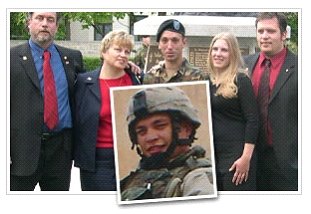My apologies for not posting in a while. Unfortunately, there is still some confusion over exactly whom I'm supposed to receive clearance from to publish this web log. Once I get permission, I will begin posting on life in Baghdad's nternational Zone. For now, operating under the time-honored Army tradition of "It's easier to beg forgivenss than ask permission," some thoughts on Jill Carroll.
One of the perks of being in the Ambassador's office is that we knew about her release a few hours before it hit the media. This good news was a welcome relief from some of the other daily frustrations stemming from Iraqi politics. At the same time, the first images to hit the airwaves about Ms. Carroll's release focused on the interview conducted at the Iraqi Islamic Party headquarters, in which she claimed that she had never been threatened, and a propaganda video made by her captors in which she called the terrorists "mujahaddein" (essentially freedom fighters) and said the war was based "on a mountain of lies."
As the story below indicates, these statements were coerced, and Ms. Carroll only made them in order to gain her release. As a U.S. servicemember, I would be bound by the Code of Conduct never to make such statements under any circumstances. As a private citizen, I can not fault her too much for doing whatever is necessary to stay alive. Some people from my office were able to meet and spend time with Ms. Carroll, who they said was extremely nice and doing surprisingly well considering her ordeal. (Although she was surprised that the Iraqis still had not formed a government during he 87 days of captivity).
It is a blessing that she was released unharmed, and the answer to everybody at the Embassy's prayers.
One further thought: CNN interviewed a "counter-terrorism" expert who stated that her propaganda video revealed the enemy in Iraq is growing more sophisticated, and hence more powerful. This is absurd. If all they wanted was a dramatic propaganda video, they could have obtained this within the first week of kidnapping Jill Carroll. Instead, they made a specific demand for the release of all women from U.S. detention, with which we refused to comply. Having failed to obtain their stated objective, and realizing that holding Ms. Carroll was causing a significant backlash with the Iraqi public, they released her. The British raid that freed the Christian Peacekeeping Team hostages may also have influenced their thinking, but either way, they were acting out of a position of weakness, not strength.
Carroll Disavows Statements Against U.S. By MATT MOORE, Associated Press Writer Protected by the U.S. military and far from the country where she had been held hostage, Jill Carroll strongly disavowed statements she had made during captivity in Iraq and shortly after her release, saying Saturday she had been repeatedly threatened.
In a video, recorded before she was freed and posted by her captors on an Islamist Web site, Carroll spoke out against the U.S. military presence. But in a statement Saturday, she said the recording was made under threat. Her editor has said three men were pointing guns at her at the time.
"During my last night in captivity, my captors forced me to participate in a propaganda video. They told me I would be released if I cooperated. I was living in a threatening environment, under their control, and wanted to go home alive. So I agreed," she said in a statement read by her editor in Boston.
"Things that I was forced to say while captive are now being taken by some as an accurate reflection of my personal views. They are not."
Carroll arrived in Germany on Saturday on a U.S. military transport plane on her way back to the United States and was expected in Boston on Sunday. The Islamic headscarf she wore as a hostage was gone, and she instead wore jeans and a gray sweater.
The 28-year-old journalist — a freelancer for the Boston-based Christian Science Monitor — was seized Jan. 7 in western Baghdad by gunmen who killed her Iraqi translator. She was dropped off Thursday — 82 days later — at an office of the Iraqi Islamic Party, a Sunni Arab organization, and later escorted by the U.S. military to the Green Zone, the fortified compound in Baghdad protecting the U.S. embassy and other facilities.
In the statement, Carroll also disavowed an interview she gave to the party shortly after her release. She said the party had promised her the interview would not be aired "and broke their word."
"At any rate, fearing retribution from my captors, I did not speak freely. Out of fear, I said I wasn't threatened. In fact, I was threatened many times," she said. "Also, at least two false statements about me have been widely aired: One — that I refused to travel and cooperate with the U.S. military, and two — that I refused to discuss my captivity with U.S. officials. Again, neither statement is true."
The remarks have drawn criticism from conservative bloggers and commentators, but the Monitor said "Carroll did what many hostage experts and past captives would have urged her to do: Give the men who held the power of life and death over her what they wanted."
Carroll has said her kidnappers confined her to a small, soundproof room with frosted, opaque windows.
After a day in seclusion, she left Balad Air Base near Baghdad on Saturday on a plane also carrying several wounded soldiers. Carroll smiled and peered with bemusement through the cockpit window at the dozens of television cameras on the tarmac at Ramstein Air Force Base.
"I'm happy to be here," she said to Col. Kurt Lohide, the U.S. officer who greeted her.
Carroll, who had studied Arabic, attracted a huge amount of sympathy during her ordeal, and a wide variety of groups in the Middle East, including the Islamic militant group Hamas, appealed for her release.
Aside from the short interview aired on Iraqi television upon her release, Carroll had otherwise not shown herself in public prior to her brief appearance Saturday.
The kidnappers, calling themselves the Revenge Brigades, had demanded the release of all female detainees in Iraq by Feb. 26 or Carroll would be killed. U.S. officials did release some female detainees at the time, but said it had nothing to do with the demands.
In the video posted Friday, her abductors said they freed Carroll because "the American government met some of our demands by releasing some of our women from prison."
Also in the video, she called on President Bush to bring American troops home.
"Tens of thousands ... have lost their lives here because of the occupation," she said in the video. "I think Americans need to think about that and realize day-to-day how difficult life is here."
She said the insurgents were "only trying to defend their country ... to stop an illegal and dangerous and deadly occupation."
In her statement Saturday, she condemned her captors, although she did not address the war in Iraq.
"I will not engage in polemics. But let me be clear: I abhor all who kidnap and murder civilians, and my captors are clearly guilty of both crimes," she said.
The Monitor's editor, Richard Bergenheim, said Friday that Carroll's parents told him the video was "conducted under duress."
"When you're making a video and having to recite certain things with three men with machine guns standing over you, you're probably going to say exactly what you're told to say," Bergenheim told ABC television.
Bergenheim said Saturday there were no negotiations that he knew of for Carroll's release and no ransom was paid. The paper hired her a week after she kidnapped.
He said she was on her way home and "her family is just absolutely rejoicing."
It was unclear precisely when Carroll would arrive. According to Richard Walsh, a spokesman for the Massachusetts Port Authority, Carroll was to land at Logan International Airport in Boston late Sunday morning.
In her statement, Carroll thanked those who had helped secure her release and said she wanted time to recover.
"This has been a taxing 12 weeks for me and for my family," she said. "Please allow us some quiet time alone, together."





